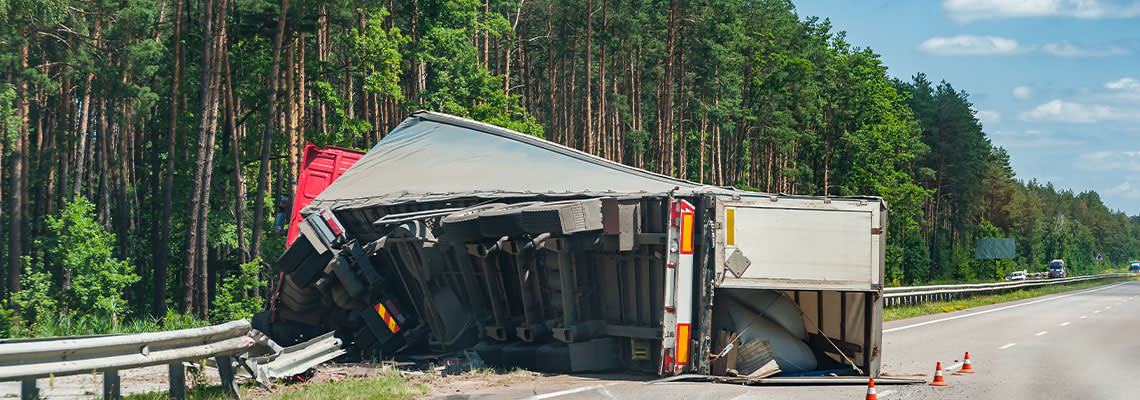When a collision with a commercial truck turns life upside down, the shock doesn’t fade quickly. Injuries can be severe, medical bills pile up fast, and work may suddenly feel out of reach.

Understanding Liability in Semi Truck Accidents: Who Can Be Held Responsible?
Semi truck accidents, often involving large commercial vehicles like tractor-trailers, are among the most devastating incidents on Missouri’s roads. Due to their size, weight, and operational intricacy, these accidents frequently result in severe injuries, fatalities, and significant property damage.
Determining liability in such cases is a critical and intricate process, as multiple parties may share responsibility. Missouri’s laws, rooted in fault-based liability, add layers of nuance to these cases, requiring a thorough understanding of state laws, federal regulations, and the roles of various stakeholders.
SJP Sifers Jensen Palmer in Kansas City, Missouri, can help explain the intricacies of liability in semi truck accidents in Missouri, identifying who can be held responsible and the factors that influence these determinations.
The Nature of Semi Truck Accidents
Semi trucks, also known as tractor-trailers or big rigs, can weigh up to 80,000 pounds when fully loaded, dwarfing passenger vehicles. A collision involving a semi truck can lead to catastrophic consequences, including traumatic brain injuries, spinal cord damage, and wrongful death.
In Missouri, major highways like I-70, I-44, and I-55 are common routes for commercial trucks, increasing the likelihood of accidents in high-traffic areas such as St. Louis, Kansas City, and Springfield.
Accidents involving semi trucks differ from typical car accidents due to the involvement of commercial entities, federal regulations governing trucking operations, and the potential for multiple liable parties.
Common causes of semi truck accidents include driver fatigue, distracted driving, mechanical failures, improper loading, and adverse road conditions. Understanding liability requires examining the actions of the driver, the trucking company, and other potential contributors to the accident.
Missouri’s Fault-Based Liability System
Missouri operates under a pure comparative negligence system, meaning that fault can be apportioned among multiple parties, and each party’s liability is proportional to their degree of fault.
For example, if a semi truck driver is found 70% responsible for an accident and the other driver is 30% responsible, damages are allocated accordingly. This system allows injured parties to recover compensation even if they’re partially at fault, though their recovery is reduced by their percentage of fault.
In semi truck accident cases, establishing liability involves proving negligence, which requires demonstrating four elements: duty of care, breach of duty, causation, and damages. The intricacy of these cases often stems from identifying all parties who may have breached their duty of care, as well as traversing the interplay between state and federal laws.
Parties Potentially Liable in Semi Truck Accidents
The following parties may be held liable when a semi truck accident occurs:
The Truck Driver
The truck driver is often the first party considered in liability assessments. Drivers owe a duty of care to operate their vehicles safely, adhering to traffic laws and federal regulations set by the Federal Motor Carrier Safety Administration (FMCSA). Common driver-related causes of accidents include:
Fatigue: Federal hours-of-service (HOS) regulations limit driving time to prevent fatigue, but violations are common. For example, drivers may exceed the 11-hour daily driving limit or fail to take mandatory rest breaks.
Distracted driving: Using a cellphone, eating, or other distractions can lead to accidents.
Impaired driving: Operating a truck under the influence of alcohol, drugs, or prescription medications is illegal and negligent.
Speeding or reckless driving: Exceeding speed limits or driving aggressively increases the risk of collisions.
Inexperience: Inadequately trained drivers may struggle to handle large vehicles, especially in adverse conditions.
If a driver’s negligence causes an accident, they can be held personally liable. However, drivers are often employees or contractors of trucking companies, which may shift or share liability.
The Trucking Company
Trucking companies can be held liable under the legal principle of respondeat superior, which holds employers responsible for the actions of employees performed within the scope of their employment.
For example, if a driver causes an accident while on duty, the trucking company may be liable. Additionally, companies can be directly liable for their own negligent practices, such as:
Negligent hiring: Failing to vet drivers for proper licensing, experience, or a clean driving record.
Inadequate training: Not providing sufficient training on safe driving practices or federal regulations.
Poor maintenance: Neglecting to inspect or repair trucks, leading to mechanical failures like brake or tire issues.
HOS violations: Encouraging or failing to monitor drivers’ compliance with hours-of-service rules.
Improper loading: Overloading or improperly securing cargo can cause trucks to become unstable.
Missouri courts may also examine whether the trucking company pressured drivers to meet unrealistic delivery schedules, contributing to unsafe practices. Trucking companies are subject to FMCSA regulations, and violations can strengthen a plaintiff’s case.
The Truck Manufacturer or Parts Supplier
Defective truck components, such as brakes, tires, or steering systems, can contribute to accidents. In such cases, the manufacturer of the truck or its parts may be liable under product liability laws.
To establish liability, plaintiffs must prove that the defect existed when the product left the manufacturer, was unreasonably dangerous, and directly caused the accident. For example, a faulty brake system that fails during a critical moment could lead to a collision, implicating the manufacturer.
Cargo Loaders
Improperly loaded or secured cargo can shift during transit, causing the truck to tip over or the driver to lose control. Cargo loaders, whether employed by the trucking company or a third-party logistics provider, have a duty to confirm that cargo is loaded safely and complies with weight and balance regulations. If their negligence contributes to an accident, they can be held liable.
Other Drivers
Other motorists on the road may share liability if their actions contribute to a semi truck accident. For instance, a passenger vehicle cutting off a truck, tailgating, or making an unsafe lane change can precipitate a collision and cause personal injury.
Missouri’s comparative negligence system allows courts to assign a percentage of fault to other drivers, reducing the liability of the truck driver or company.
Government Entities
In rare cases, government entities responsible for road maintenance may be liable if poor road conditions, such as potholes, inadequate signage, or poorly designed intersections, contribute to an accident.
However, suing a government entity in Missouri is challenging due to sovereign immunity, which limits liability unless specific exceptions apply, such as negligence in maintaining public property.
Third-Party Maintenance Providers
If a third-party company is responsible for maintaining or repairing the truck, its failure to perform adequate inspections or repairs can lead to liability. For example, a mechanic who improperly services brakes may be held responsible if brake failure causes an accident.
Federal and State Regulations Impacting Liability
The FMCSA sets stringent regulations for the trucking industry, which play a significant role in determining liability. Key regulations include:
Hours of service (HOS): Drivers must adhere to limits on driving hours (e.g., 11 hours maximum per day after 10 consecutive hours off duty) and maintain accurate logbooks, often via electronic logging devices (ELDs).
Vehicle maintenance: Trucking companies must conduct regular inspections and maintenance to make sure trucks are roadworthy.
Driver qualifications: Drivers must hold a valid commercial driver’s license (CDL) and meet health and training requirements.
Weight and load limits: Trucks must comply with federal and state weight limits, and cargo must be properly secured.
Violations of these regulations can serve as evidence of negligence in court. Missouri also imposes state-specific regulations, such as speed limits and weight restrictions on certain highways, which can influence liability determinations.
For assistance with determining liability through Missouri’s fault-based system, contact a personal injury lawyer.
Proving Liability in Missouri
To establish liability, plaintiffs must gather substantial evidence, including:
Police reports: Official accident reports provide details about the crash, including witness statements and initial findings.
Electronic logging device (ELD) data: ELDs track driving hours, speed, and other metrics, revealing potential HOS violations.
Black box data: Many trucks are equipped with event data recorders that capture information like speed, braking, and steering before a crash.
Maintenance records: Records can show whether the truck was properly maintained or if known issues were ignored.
Witness testimony: Eyewitness accounts can corroborate the sequence of events.
Expert analysis: Accident reconstruction experts, engineers, or medical professionals may provide testimony to establish causation and damages.
Missouri’s statute of limitations for personal injury claims, including semi truck accidents, is five years from the date of the accident (Mo. Rev. Stat. § 516.120). For wrongful death claims, the statute is three years (Mo. Rev. Stat. § 537.100). Prompt investigation is critical to preserve evidence, as trucking companies may not retain records indefinitely.
Contact a Personal Injury Attorney
Determining liability in semi truck accidents in Missouri is a multifaceted process involving drivers, trucking companies, manufacturers, and other parties. Missouri’s comparative negligence system, combined with federal and state regulations, shapes how fault is assigned and how damages are awarded.
Our personal injury attorney at SJP Sifers Jensen Palmer can help you through this process. We serve the Kansas City Metropolitan area and Springfield, Missouri. Call us today.
RECENT POSTS
Few situations feel more frustrating than filing a property damage claim in good faith, only to receive a denial letter. After paying premiums for years, many policyholders expect their insurance company to step in when damage occurs. Instead, they’re often met with confusing explanations, partial denials, or outright refusals.



